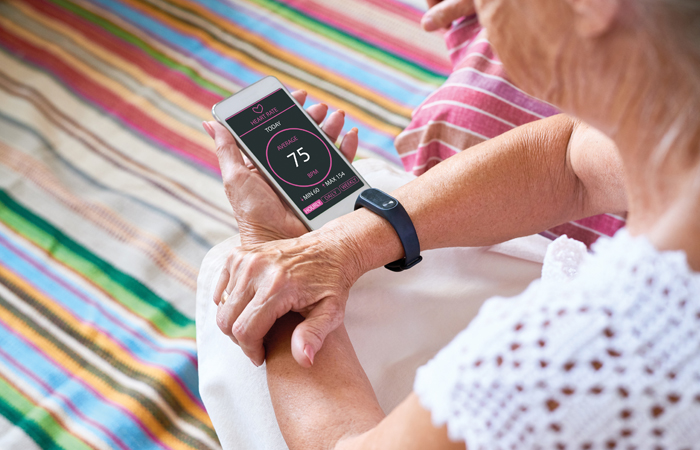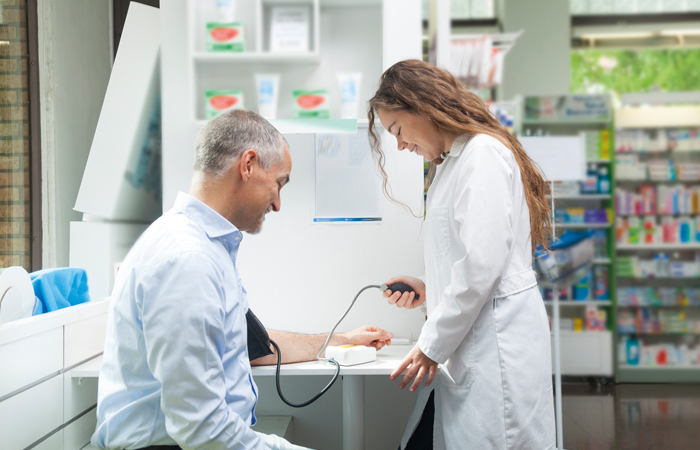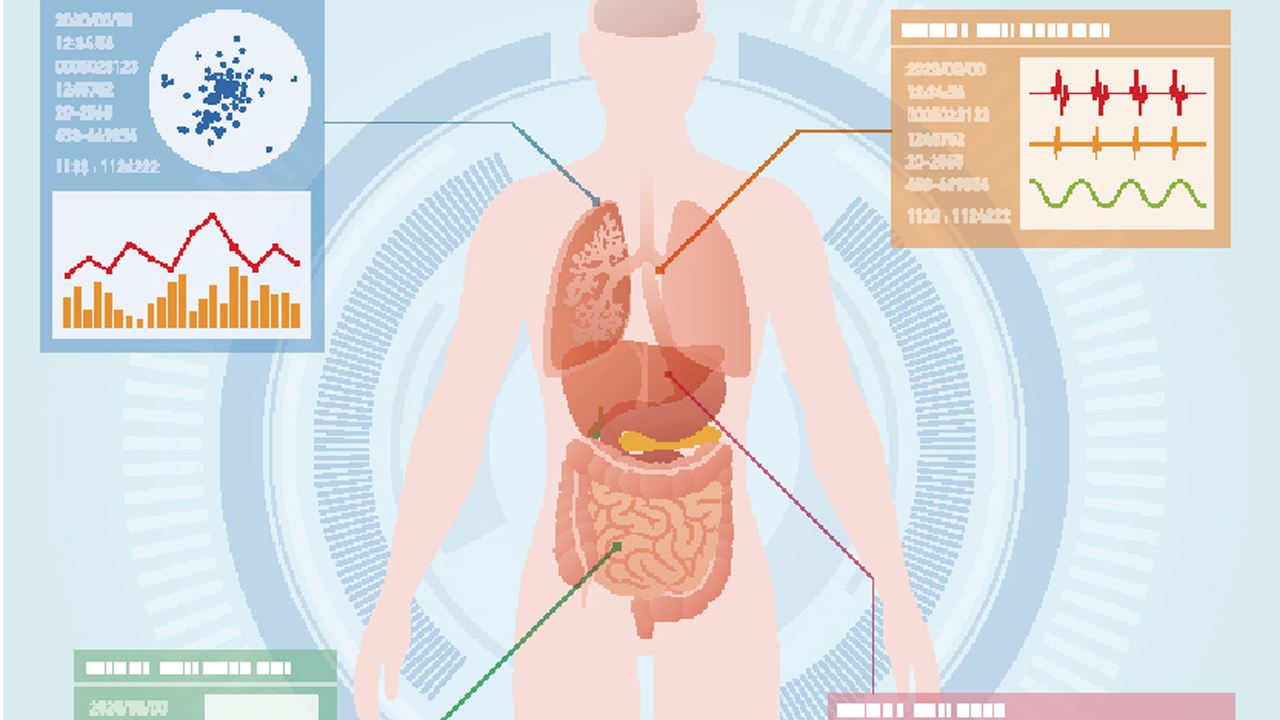In Conditions
Follow this topic
Bookmark
Record learning outcomes
There is no doubt that local pharmacies are at the heart of NHS primary care services, with pharmacy teams interacting with 1.6 million people every day, according to the National Institute for Health and Care Research. Let’s explore some of the many ways pharmacy teams are providing screenings.
Taking on the task
The community pharmacy role is increasingly focusing on giving more advice and providing more healthcare services to patients in the community, including the new Pharmacy First Advanced service.
“Given their unique position at the heart of communities, pharmacies are ideally placed to support access to health checks and tests through NHS-funded services,” says Alastair Buxton, director of NHS Services at Community Pharmacy England. “Enabling pharmacy teams to provide testing and, where appropriate, access to test results in patient’s medical records could help to reduce the demand on general practice, supporting safer provision of medication and creating opportunities for more person-centred interventions and care.”
The national NHS Health Check is commissioned by local authorities and delivered through GP surgeries and community pharmacies. Around 1.3 million health checks are delivered each year. The service involves a face-to-face check-up for adults aged 40-74, helping to spot early signs of stroke, kidney disease, heart disease, type 2 diabetes or dementia. In June 2023, the Government announced that a new digital NHS Health Check will be launched this spring, working alongside the existing in-person programme. This is expected to deliver an additional one million checks over four years, while easing pressure on GP surgeries.
What’s on offer
Current diagnostic services within community pharmacies include blood pressure checks, cholesterol testing, blood glucose monitoring and body mass index (BMI). Many community pharmacies are expanding further on the NHS and private services they already offer.
“Nuffield Trust and The King’s Fund identified ‘preventing ill health and supporting wellbeing’ as one of the four pillars of their vision for Community Pharmacy,” says Alastair.
“As well as offering advice and support to make healthier lifestyle choices, it recommends that pharmacies provide a range of public health services and targeted health checks, such as cholesterol tests. In time, it would be a natural development for pharmacy teams to support early detection of ill health through advances in technology such as smartphones or wearables, making this type of support available to a much wider section of the population and so help reduce health inequalities.”
“At a time where preventive care is paramount, these tests not only enhance early detection but also promote informed decision-making”
Our Future Health
Since 2022, Kirby Sowden, Boots UK pharmacy advisor and trained phlebotomist at The Broadway, Bradford store, has been taking part in a research programme called Our Future Health. The programme, which is in partnership with the NHS, aims to help people live healthier lives for longer through the discovery and testing of more effective approaches to the prevention, earlier detection and treatment of diseases. Blood samples are used to extract DNA for genetic analysis and are also kept for future research, such as assessing cholesterol or blood sugar levels and the risks of disease. All identities and personal details are kept confidential.
“Patients may volunteer for the service after receiving a letter in the post, or they may see the programme advertised and register online,” says Kirby. “They have to fill in an extensive questionnaire, with information about health conditions and general lifestyle, such as exercise, diet and alcohol intake. From a pharmacy point of view, the service gets more people through the door.”
Our Future Health is suitable for people of all ages and all health problems. The participants have to give permission for the programme to combine their results and blood samples with existing information, including their health record. The service doesn’t provide ongoing monitoring and isn’t intended to be a personal health check. However, participants are asked to give their permission for Our Future Health to contact them in the future about follow-on research or personal feedback about their health, if they want to receive it.
“We check their blood pressure, cholesterol with a finger prick test, height and weight, and also take two small tubes of blood,” says Kirby. “We can give patients the blood pressure, cholesterol and height/weight results before they go, but they don’t get the blood test results – those are purely for research purposes. We can’t give personalised advice as part of Our Future Health, but if they have high blood pressure or high cholesterol, we may refer them to the pharmacist for a full medical assessment. We can also give them relevant leaflets and signpost them to their GP.”
In-store blood pressure testing
The Hypertension Case-Funding Service – also called the NHS Community Pharmacy Blood Pressure Check Service – was commissioned as an advanced service in October 2021. Anyone over 40 who isn’t already taking blood pressure medication is eligible. The service was expanded in December 2023 to involve more of the pharmacy team (pharmacists, pharmacy technicians and other non-registered members) and increase the use of ambulatory blood pressure monitoring (ABPM). This means that suitably trained and competent pharmacy staff can now also carry out the blood pressure checks.
Leanne Shore, pharmacy dispenser at the Goodlife Pharmacy in Hatton, Derby, offers several in-store pharmacy services, including blood pressure checks. “We ask patients who are picking up a prescription when they last had their blood pressure checked,” she says. “We also ask patients who come in regularly, or sometimes patients say that their GP has requested a blood pressure review. If their blood pressure is considered high, we can offer them an ambulatory 24-hour blood pressure machine. This is more accurate than taking a single snapshot of their blood pressure in the pharmacy. At home, when they are more relaxed, their blood pressure may be normal. We then check the readings and send them to their GP.”

Wearables like smartwatches are another way pharmacy teams can encourage patients to keep track of aspects of their health.
Phlebotomy services
Many pharmacies are now offering blood testing services by trained phlebotomists. Leanne is also a trained phlebotomist, performing blood tests at the Goodlife Pharmacy in association with the Goodbody Clinic (health.goodbodyclinic.com). “A lot of people use our blood testing service because they can’t access the blood tests they want through their GP or they can’t get an appointment with their doctor’s surgery,” she says. “It’s a private service so people have to pay.”
The pharmacy advertises the phlebotomy clinic on a large poster outside. “We also use prescription bags from the Goodbody Clinic,” explains Leanne. “These list examples of the blood tests available, so the details are seen by every patient picking up a prescription. Patients can walk in for an appointment, or book in advance via the Goodbody clinic website. “Lots of the patients aren’t local and some travel for an hour or two to get here for a blood test,” adds Leanne.
The phlebotomy clinic offers around 60 different blood tests. “We offer routine blood tests, such as cholesterol and thyroid, but also more unusual ones, such as pre-natal tests that check the health of the baby during pregnancy,” she says. “Some men like to have their testosterone levels checked while they are taking medication to make sure it’s having an effect.”
The phlebotomy clinic doesn’t involve any diagnosis within the pharmacy – it’s purely just a blood-taking clinic. However, patients can arrange a follow-up GP appointment through Goodbody Clinic to discuss the results. “We take the blood and send it to the laboratory, so don’t usually see the outcome,” says Leanne. “But some customers tell us afterwards. One man came in for an advanced Well-Man service – some cancer flags came up in the blood test, which caught his cancer early on. It shows how effective and useful this service can be.”
“Early diagnosis is key to the successful management of many chronic health conditions”
Expanding at-home testing services
Increasing numbers of pharmacies are selling home testing kits directly to customers, from pregnancy tests to allergy tests. According to Numark, the home testing market is projected to witness a growth of over 50 per cent by the year 2030, driven by the ongoing challenges faced by the NHS, the aging population, and the drive toward innovative solutions. “Pharmacies play a vital role in public health by offering accessible and convenient health tests both in-store and through home test kits,” says professor Claire Anderson, Royal Pharmaceutical Society (RPS) president. “These allow patients to monitor different aspects of their health, from blood pressure to cholesterol levels. Additionally, pharmacists who have regular interactions with patients can detect early signs and symptoms of various diseases or conditions, including mental health issues and dementia. At a time where preventive care is paramount, these tests not only enhance early detection but also promote informed decision-making. By bridging the gap between professional guidance and personal wellbeing, pharmacies contribute significantly to healthier communities.”
Last year, Rowlands Pharmacies (via Numark) announced a partnership with rapid test supplier 2San to launch self-diagnostic tests through their stores, to take the pressure off the NHS. The at-home tests, which are also sold online, address common health concerns, including urinary tract infections (UTIs), male infertility, iron deficiency, stomach ulcers (H. pylori) and the menopause. Rowlands Pharmacy is also offering support and advice both in-pharmacy and via their website to ensure that their customers are given clear recommendations based on their test results. In addition to this, their pharmacy teams have been given access to training materials to answer customer queries, and plans are in place to make in-pharmacy treatments available for selected conditions that can be identified with the 2San tests, allowing Rowlands Pharmacy to provide a complete solution.
“We are excited to have these home testing kits available to Numark members and Rowlands pharmacies,” says Stephen Thomas, superintendent pharmacist at Rowlands. “Extending diagnostics services to community pharmacies via home testing is a crucial step in supporting the NHS. We aim to assist customers to detect potential conditions early and take control of their health. By providing treatment guidance for colleagues working in pharmacy we aim to help customers manage their condition in the event of a positive result.”

Blood pressure testing in the pharmacy is a valued service which provides quick and efficient results for customers.
Pharmacy First launch
In January 2024, Community Pharmacy England (CPE) released a series of resources to help promote the new Pharmacy First service to patients and members of the public. According to CPE, more than 90 per cent of community pharmacies have signed up for the service, believing that Pharmacy First will improve patient care. However, there are concerns that the launch of the service has been rushed and may be delayed by practical issues, such as inadequate staffing and IT problems.
This new advanced service incorporates existing elements of the Community Pharmacist Consultation Service, i.e. minor illness consultations with a pharmacist and the supply of urgent medicines and appliances. Enrolled pharmacies must have a consultation room that meets the Terms of Service requirements for the Pharmacy First service, along with accessible IT equipment within the consultation room connected to the NHS-assured Pharmacy First IT system.
Patients can access the Pharmacy First service directly (as a walk-in service without a referral), as well through a referral by NHS 111, GP surgeries and other authorised healthcare providers. Patients should be referred to a pharmacy during normal working hours.
Pharmacy teams will be providing advice on these seven common conditions using clinical pathways:
- Sinusitis
- Sore throat
- Acute otitis media (middle ear infections)
- Infected insect bite
- Impetigo
- Shingles
- Uncomplicated urinary tract infections (UTI) in women.
Patients will be supplied, where clinically necessary, with a prescription-only treatment under a Patient Group Direction (PGD) or in one pathway, an over-the-counter medicine (supplied under a clinical protocol), all on the NHS. In the future, it is hoped that independent prescribers will be able to use their skills to complete episodes of care within the service, without the need for a PGD.
Pharmacists and pharmacy teams providing the service must be competent and familiar with the clinical pathways, clinical protocols and PGDs. This may require further training. All pharmacists enrolled in the service need to have an otoscope available and must be trained to do ear examinations. Pharmacists must also be trained to examine patients (e.g. diagnose a rash) or examine a sample of urine (on the UTI pathway).
CPPE has a range of learning tools at: cppe.ac.uk/services/pharmacy-first. Videos talking pharmacists through each clinical pathway are available on the CPE website.
To ensure the self-referral aspect of the service is a success, the public needs to know that the service is available and how it works. CPE promotional materials to target the public include posters, social media content, flyers and a local press release. A media campaign is also being planned with NHS England and the Department of Health and Social Care (DHSC), featuring community pharmacists, for when the service is fully up and running.
Training Matters will also be providing education and learning modules throughout the year on referral pathways and the seven conditions, with the aim to improve the learning of the whole pharmacy team. See page 30 to get started with our CPD module on sore throats – as part of our Pharmacy First CPD series.

